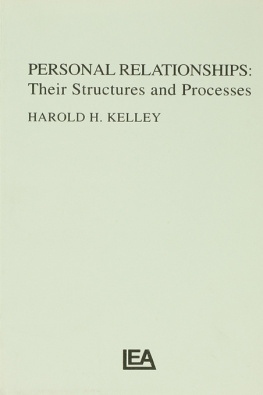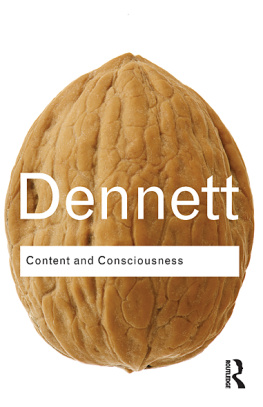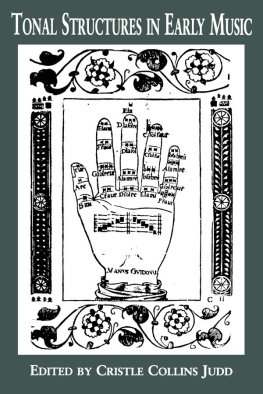
PERSONAL RELATIONSHIPS:
Their Structures and Processes
JOHN M. MacEACHRAN MEMORIAL
LECTURE SERIES,
Sponsored by
The Department of Psychology
The University of Alberta
with the support of
The Alma Mater Fund of the University of Alberta
in memory of John M. MacEachran,
pioneer in Canadian psychology
PERSONAL RELATIONSHIPS:
Their Structures and Processes
HAROLD H. KELLEY
University of California, Los Angeles

Copyright 1979 by Lawrence Erlbaum Associates, Inc.
All rights reserved. No part of this book may be reproduced in any form, by photostat, microform, retrieval system, or any other means, without the prior written permission of the publisher.
Lawrence Erlbaum Associates, Inc., Publishers
62 Maria Drive
Hillsdale, New Jersey 07642
Library of Congress Cataloging in Publication Data
Kelley, Harold H.
Personal relationships
(John M. MacEachran memorial lecture series; 1978)
Bibliography, p.
Includes index.
I. Interpersonal relations. I. Title. II. Series.
HM132.K44 301.11 79-11609
Printed in the United States of America
Contents
Foreword
The vigor and intellectual development of social psychology emanated from the genius of a group of social psychologists working at Kurt Lewins Research Center for Group Dynamics at the Massachusetts Institute of Technology. These social psychologists initiated work on communication processes, social motivation and person perception. We are very honored to have Harold Kelley, a member of this group, as our fourth MacEachran lecturer. As I shall chronicle events, youll see that many of the major developments in the field of social psychology have been marked by the presence of Harold Kelley.
His intial work in psychology began with his study of measurement, statistics, social, physiological and experimental psychology at the University of California at Berkeley. After obtaining his master of arts degree there, he was associated with the Aviation Psychology Program of the Army Air Force during the war. Based on his association with Stuart Cook and others, his interest in social psychology developed into a career decision. Advised by Cook, and encouraged by his association with a number of other aspiring social psychologists, he went to Lewins Research Center for Group Dynamics at the Massachusetts Institute of Technology in 1946. During this time he did his research on first impressions in interpersonal relations under the advice of Dorwin Cartwright. After obtaining his doctoral degree, he went to the University of Michigan where he worked with Leon Festinger, engaging in studies of social attitudes and informal social communication within communities and in small groups. He then joined the faculty at Yale University and was part of the group conducting research on attitude change, persuasive communication and attitude scaling with Irving Janis and Carl Hovland. In this program they developed a major systematic approach to the psychological processes underlying communication and attitude change.
He continued his studies of social power, influence and communication at the University of Minnesota, and in 1957, at the Center for Advanced Study in the Behavioral Sciences, developed a collaborative relationship with John Thibaut that eventuated in the publication of a book The Social Psychology of Groups. This book, which presented a systematic theory of group processes and stimulated much research on bargaining, negotiation, and coalition formation, has become identified as one of the several major contributions to an exchange theory perspective on social behavior.
His position in 1961 at the University of California. Los Angeles has continued to the present and in that time he has not only completed further research on the social psychology of groups, bargaining and conflict but has developed theoretical work in the area of causal attribution. In this approach, concerned with the development of causal inferences about behavior, he returned to his historical origins in gestalt theory. His ideas have provided an impetus for research and have melded with those of others to spark new ideas that have enriched theoretical developments and opened new empirical areas. While there is no doubt that his work on the social psychology of groups has been influential, it is very clear that his work on attribution theory has had an impact on the field to a greater extent perhaps than that of any recent theorist in the area of social psychology.
During his career he has, of course, been functioning as a member of many editorial boards and consulting editorships of our major journals; he has been President of Division 8 of the American Psychological Association, President of the Western Psychological Association, and has served other professional functions too numerous to detail here.
Recognition of his considerable contribution to the field of psychology was formalized by his being awarded the Distinguished Scientific Contribution Award in 1971 from the American Psychological Association. I quote his citation, For the development of fundamental theory that has given a systematic framework to research on interpersonal processes and for penetrating and insightful experimental studies that have illuminated and extended our understanding of these processes.
His current endeavors include theoretical work on conjuring, the art of attribution manipulation and magic, and on close relationships. The material presented herein represents what Hal Kelley has thought and learned about the social psychology of close relationships.
Brendan Gail Rule
University of Alberta
Preface
It is an honor to contribute to the succession of distinguished books based on the MacEachran Memorial Lecture Series, sponsored by the Department of Psychology at the University of Alberta. I gave the fourth lectures in this series on March 27 to 29, 1978, and have spent the four months since preparing them for this book. When invited to give the lectures, I decided to combine a description of my own recent research on young couples with a proposal for a theoretical framework for viewing such relationships. In the execution the second purpose has become the dominant one. My research has proven to be suggestive of some of the necessary key concepts in the theoretical analysis. However, the research was not done with this total framework in mind, so it cannot be considered in any sense a test of the concepts.
With regard to the theoretical analysis, the reader will realize that this is a progress reportan account of ideas that are still in the progress of development. I am confident that the starting point of the analysis is a good one. The ideas take account of what are certainly the central phenomena of the personal relationship. I also have a good deal of confidence in the long-term viability of the types of concepts adopted for analyzing these phenomena. I am less sure of the particular ways the concepts are specified and ordered here. They serve to organize and give meaning to a diverse array of interpersonal events, but their derivations and operationalizations are not as clear at this time as I would like.
I am deeply grateful to the psychologists at the University of Alberta for providing the opportunity and the impetus to assemble these data and develop these ideas. I will long appreciate the hospitality extended me, by faculty and students alike, during my stay in Edmonton. Special thanks are due Eugene Lechelt for his excellent arrangements and Brendan and Stanley Rule for their kind attentions.
Next page







